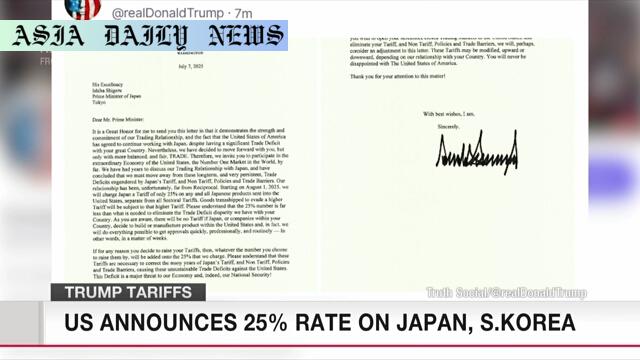Tariff: US President Donald Trump announces 25% tariff on Japan, post warning on social media, also hits South Korea with same rate.

US Implements Stronger Tariff Measures Against Japan and Others
The United States is ramping up trade tensions, with President Donald Trump recently announcing a 25% tariff on Japan starting next month unless both nations reach a satisfactory trade agreement. This figure, as outlined in Trump’s official letter posted on social media, marks a significant escalation aimed at addressing what he describes as a ‘trade deficit disparity.’ Japan’s current tariff rate of 24% will rise incrementally, a move the president labels necessary to counteract Tokyo’s ‘unfair trade practices,’ particularly within agricultural and automotive sectors. This development has sparked significant concern within Japan’s leadership and global economic markets.
Implications for South Korea and Other Trading Partners
In addition to targeting Japan, the US has imposed a 25% tariff on South Korea, further complicating diplomatic and economic relations in the region. The White House’s Press Secretary, Karoline Leavitt, confirmed that letters detailing these changes will be issued to 12 other trading partners. This broadening tariff coverage reflects the administration’s aggressive policy stance on reducing trade imbalances. Trump’s executive order extending the previous deadline to August 1st signals a willingness to negotiate but conveys a clear ultimatum to foreign trade partners.
Japan’s Strategic Response to Tariff Policies
As Japan absorbs the implications of Trump’s announcements, its Prime Minister Ishiba Shigeru’s government views the letter as an opportunity to push for extended negotiations. Senior Japanese officials express hope for an amicable trade solution, emphasizing plans to engage in dialogue with the US in the weeks ahead. The administration remains optimistic that bilateral agreements could prevent economic repercussions stemming from the increased tariffs. However, the threat of additional hikes if Japan responds with countermeasures looms large over the ongoing negotiations.
Trade Policies and Bilateral Relationships
The letter posted by Trump underscores not only economic but also political undertones in US-Japan relations. By noting that trade decisions could shift based on the nature of relationships, the administration effectively ties diplomatic cooperation to economic policy. For Japan, which has long relied on a stable US trade partnership, this development signals a potential recalibration of its foreign and trade strategies, aiming to mitigate the long-term impact on key industries.
Global Reactions and Economic Consequences
The international community is closely monitoring the escalation of these trade policies. Concerns over their potential effects on global supply chains, especially in sensitive sectors like automotive manufacturing, are gaining traction. Economists are evaluating the broader implications of such tariffs, fearing retaliatory measures could trigger trade wars beyond Asia. As negotiations progress, global stakeholders are analyzing strategies to shield their own interests from the ripple effects of the US tariff hikes.
Commentary
Dealing with Tensions in US-Japan Relations
The announcement of a 25% tariff on Japan by US President Donald Trump signals a crucial turning point in international trade relations. While this measure is positioned as a tool for balancing trade disparities, the aggressive tone of its implementation raises serious questions about the long-term health of US relations with its East Asian ally. For Japan, this move reaffirms the need to diversify its economic alliances, as traditional partnerships may no longer guarantee stability.
Broader Implications of Competitive Tariff Policies
Trump’s decision highlights the consequences of prioritizing unilateral economic policies over multilateral trade solutions. The approach reflects a broader shift in international relations, where economic measures are increasingly leveraged for political gain. The global response to these tariffs—both immediate and long term—will determine whether the US emerges successful in its quest to reshape existing trade balances or faces significant backlash from affected nations.
The Role of Diplomacy Amid Trade Conflicts
At its core, this situation calls for renewed emphasis on the importance of diplomacy. While economic grievances may justify heightened tariffs, communication between nations remains essential to prevent misunderstandings and escalation. For Japan, engaging constructively with the US while protecting local industries will be paramount. Forging new trade pacts with alternative allies could offer a safeguard against future policy shifts in the US.


